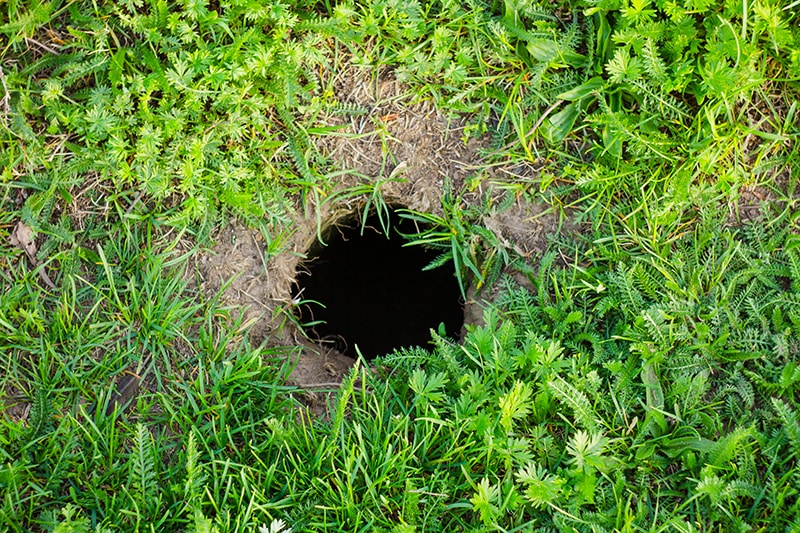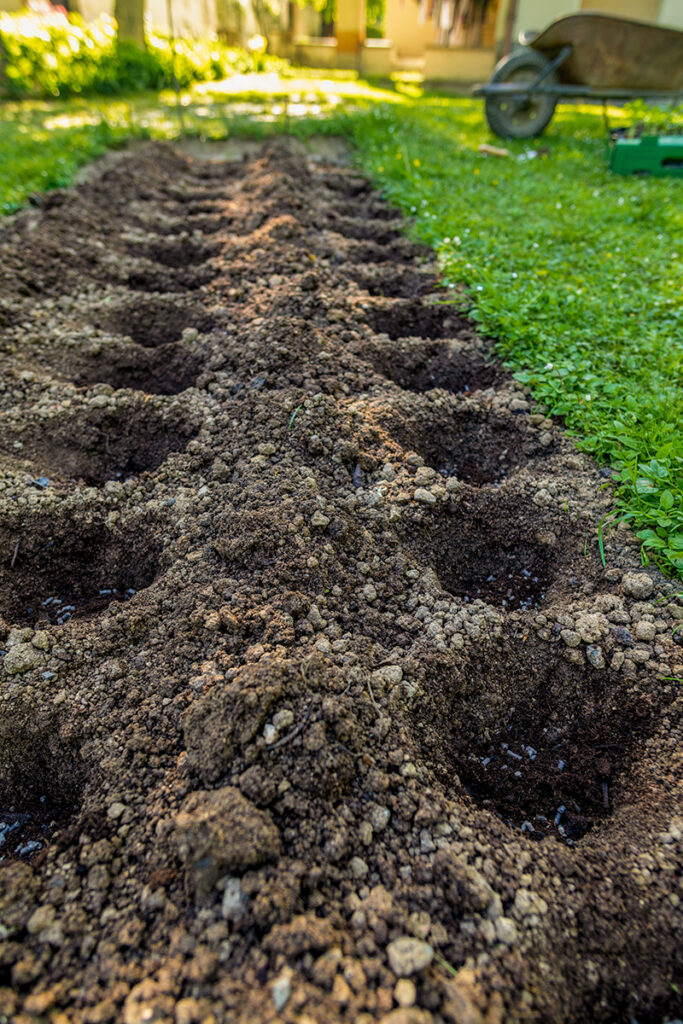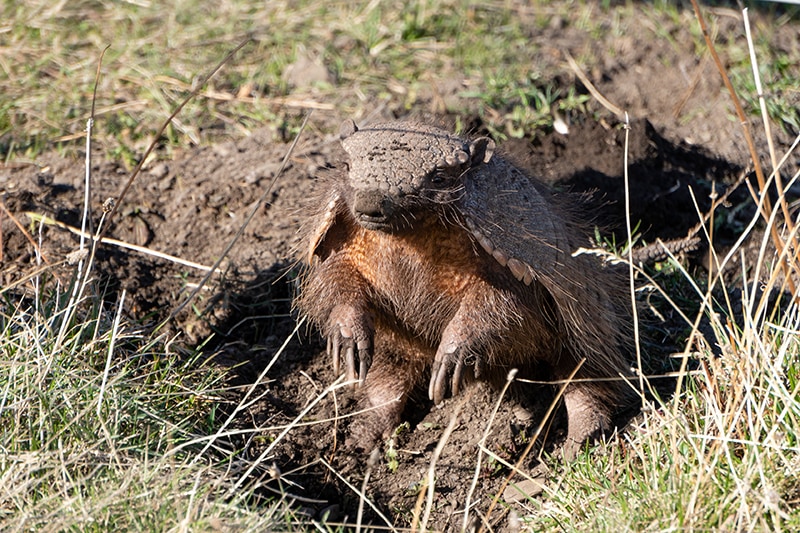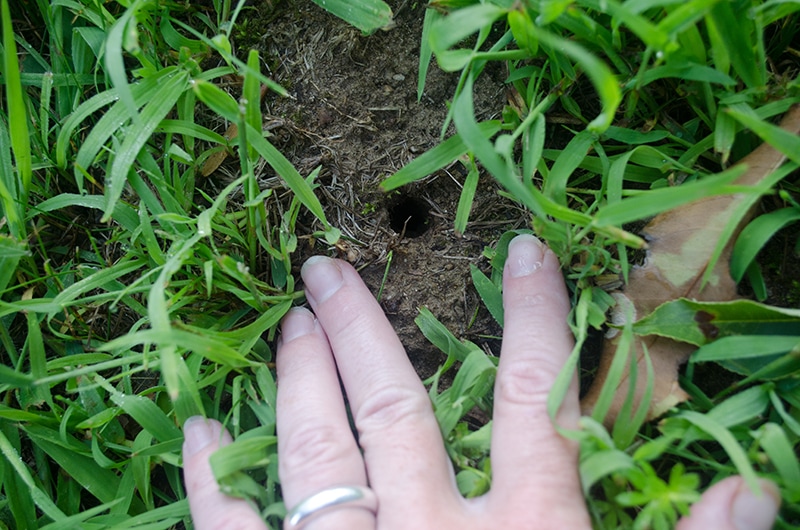What Is Digging Holes in My Yard? 4 Clues to Find Out
-
Codee Chessher
- Last updated:

If you’ve noticed mysterious holes suddenly appearing in your yard overnight, you’re not alone. Many people face this very same problem and wonder how to find out the culprit. Luckily, there are several clues you can watch for to uncover the identity of your yard vandal. It could be small insects or invertebrates, larger mammals, or something unrelated entirely. Let’s delve into those clues in more detail below.

The 4 Clues to Find Out What is Digging Holes in Your Yard
1. Garden Holes

If there are small or medium-sized holes in your garden, particularly vegetable gardens, you’re looking at a small mammal. Voles and moles are the main ones that dig holes, which they use to get around underground. Mole holes have mounds or molehills on top, while vole holes have just a naked opening.
They may also be damaging your prized plants, which is a strong indicator that moles or voles are to blame. Rabbits and mice have also been known to dig and frequent vegetable patches, though, so stay on the lookout.
2. Large Holes

Large holes are a sign of a larger creature, clearly, but there are several candidates. The skunk, red fox, armadillo, and groundhogs make pretty big holes, but so do turtles. In fact, gopher tortoises make some of the biggest holes you can find in a yard or garden. They’re also usually protected by state law, so you can’t really do anything about them.
Skunk holes are typically large in diameter but shallow, with a lot of churned-up soil. Believe it or not, this is actually good for your soil! Meanwhile, fox holes are typically deep underneath the base of trees or walls, four inches or larger in diameter.
Lastly, armadillos can make large holes up to 7 inches in diameter and 16 feet in length when digging a nest to raise young. They prefer to dig around large rocks, stumps, and other big, solid structures.
Consult a PEST-CONTROL expert
Find a pest-control specialist in your area, and get free, no-commitment estimates for your project.

3. Small Holes

Small holes are harder to narrow down because their unique characteristics are, well, much smaller and variable. Broadly, you’re looking at either insects or rodents. Let’s try to filter those down into specific animals below.
- Earthworms: if there are enough, earthworms can make a real mess in your yard while leaving behind small, rounded mounds or lumps of soil.
- Digger bees: these guys prefer to dig individual holes in the ground, with large nests featuring dozens of holes as they interconnect them.
- Hornets & Wasps: both hornets and wasps can leave several large, conical holes near each other in moist soil, where they lay their eggs.
- Wood mice: similar to voles, wood mice can dig surprisingly sophisticated tunnel networks in underground fields and other open areas
- Chipmunk: another classic pest, chipmunks can dig holes up to 30 feet in length and a few inches in diameter
- Raccoons: these striped bandits can dig holes, but prefer to dig out or reuse other rodents’ abandoned holes
4. How to Deter Yard Diggers

The best ways to prevent yard digging are physical barriers like chicken wire or wire mesh. Used with fabric just underground, wire mesh can prevent tunnel-digging animals like mice and foxes. Erecting a chain-link fence also proves to be a deterrent, albeit not as effective.
Chemical deterrents are easier to use but don’t work long-term. Cayenne pepper, essential oils, vinegar, and other pungent odors can be sprinkled around your yard to deter digging scavengers. These animals usually have very sensitive senses of smell, so the stronger the smell, the better. Don’t use harsh or toxic chemicals like bleach, though! A word of caution: whatever you spray on your yard will need to be reapplied after rainy weather.

Conclusion
It can be tricky to figure out what’s digging holes in your yard, but generally, it’s either insects, rodents, or slightly larger mammals. Mice can dig really complicated networks underground, while skunks and raccoons are less clever with their holes. Every animal has a unique way of digging that can be used to identify them, so just pay close attention to how the holes in your yard look.
- Related Read: How to Get Rid of a Skunk in Your Yard
Featured Image Credit: Renat Kamalov, Shutterstock
Contents